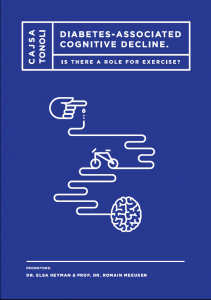Diabetes-Associated Cognitive Decline. Is There A Role For Exercise?

Presentation of the dissertation
Patients with type 1 diabetes (T1D) show a cognitive decline when compared with non-diabetic subjects, the so called diabetes-associated cognitive decline (DACD). The potential causes of this DACD are mainly the episodes of severe hypoglycaemia and chronic hyperglycaemia. Exercise is commonly used as an intervention to promote brain health. The positive influence of exercise on brain functioning is established through several mechanisms. Among them, neurotrophic factors seem to play a crucial role. Brain-Derived Neurotrophic Factor (BDNF), Insulin-like Growth Factor (IGF-I) and even insulin are neurotrophic factors that mediate hippocampal synaptic plasticity and their effects in the brain of non-diabetic patients are settled by exercise. However, in T1D the effects of exercise on neurotrophic markers are not yet established. Exercise, however, is recognized to have several well-known positive effects on acute and chronic glycaemic control in T1D patients as can be observed in one of the meta-analytic studies performed during this PhD project. In a review paper we showed that several forms of exercise (acute aerobic exercise, resistance exercise, mixed exercise, and high intensity exercise), all acutely decrease blood glucose levels. Furthermore, we pointed out that regular aerobic training programs improves chronic glycaemic control in T1D patients.
Hypothesis & aim of this dissertation
Since (i) acute and chronic glycaemic control contribute to DACD, (ii) exercise positively influences acute and chronic glycaemic control and (iii) exercise is commonly used as an intervention to promote brain health in non-diabetic populations, we hypothesized that exercise may be of great clinical relevance to decrease or counteract the deleterious effects of diabetes on the brain and cognitive function. Consequently, the aim of this dissertation was to study the effects of long-term physical activity (PA) and acute exercise at different intensities on cognitive functioning, blood glucose, BDNF and IGF-I levels.
Studies performed during this dissertation
Several studies were performed to examine the effects of long term PA, as well as the effects of acute exercise on cognitive function, BDNF, IGF-I and blood glucose in T1D patients. First, the impact of long-term PA on cognitive function in a T1D patient population of the diabetes clinic (UZ Brussels) was examined. We investigated the possible association between basal levels of BDNF and IGF-I, exercise and cognitive function. This first study showed that several factors can predict cognitive functioning in T1D: the level of PA, education, glycaemic control, BDNF levels, diabetes duration and the number of hypoglycaemia episodes.
In a second experiment, the effects of acute high intensity exercise (HIE) on cognitive function and neurotrophins were studied in ten trained T1D patients and their matched (by age, gender, fitness level) controls. They were evaluated on 2 occasions: a maximal test to exhaustion and a HIE bout (10 x [60s 90%Wmax, 60s 50W]). We showed that higher BDNF levels and lower total IGF-I levels in T1D compared to the control group at all-time points. Furthermore it was observed that HIE increased BDNF and IGF-I in T1D and healthy participants in a similar way. Thus, we concluded that the improvements in cognitive function after a HIE in trained T1D participants and their matched controls were comparable, suggesting that there was no difference in how their brain responded to HIE.
In the final study of this dissertation, the effects of different types of exercise intensities on neurotrophins in T1D were examined. Ten participants with type 1 diabetes were evaluated on 3 occasions: a high intensity (10 x [60s 90%Wmax, 60s 50W]), a continuous (22 min, 70% VO2max) exercise, and a control session. We showed that both exercise intensities changes neurotrophins in T1D, with a dose response effect for BDNF, which is in line with studies performed in non-diabetic humans.
Conclusion
We showed that in T1D higher levels of PA are associated with better cognitive function, especially executive functioning,. Acute exercise (different exercise intensities) modulates neurotrophic factors, especially BDNF, in a dose-response manner. Altogether, the results of our studies could help to design specific exercise programs for improvement of cognitive function in T1D.
This article is about: Cajsa Tonoli, Diabetes Associated Cognitive Decline, PhD
« Back to overview